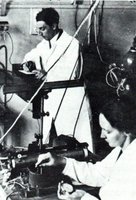Joliot, Frédéric

| Topics: |
Frédéric Joliot (1900–1958), born in Paris, France, March 19, 1900, was a graduate of the Ecole de Physique et Chimie of the city of Paris. His father Henri was a merchant and his mother was Emilie Roederer. In 1925 he became, at the Radium Institute, assistant to Marie Curie. There, Joliot met her daughter, Iréne, whom he married in 1926. Joliot obtained his Doctor of Science degree in 1930, having prepared a thesis on the electrochemistry of radio-elements, and became lecturer in the Paris Faculty of Science in 1935. At this time he carried out considerable research on the structure of the atom, generally in collaboration with his wife. In particular they worked on the projection of nuclei, which was an essential step in the discovery of the neutron and the positron. However, their greatest discovery was artificial radioactivity in 1934. By bombarding boron, aluminum, and Magnesium with alpha particles, they produced the isotope 13 of nitrogen, the isotope 30 of phosphorus and, simultaneously, the isotopes 27 of silicon and 28 of aluminum. These elements, not found naturally, decompose spontaneously, with a more or less long period, by emission of positive or negative electrons. For this very important discovery, Frédéric and Iréne received the 1935 Nobel Prize for Chemistry. These isotopes rapidly became important tools in biomedical research and in the treatment of cancer.

During this time, Joliot, who had always taken an interest in social questions, joined the Socialist Party, the S.F.I.O., then the League for the Rights of Man.
In 1937, Joliot was nominated Professor at the Collège de France. He left the Radium Institute and built the first cyclotron in Western Europe for his new nuclear chemistry laboratory. After the discovery of the fission of the uranium nucleus, he produced a physical roof of the phenomenon; then with Hans Halban and Lev Kowarski, joined by Francis Perrin, he worked on chain reactions and the requirements for the successful construction of an atomic pile using uranium and heavy water; five patents were taken out in 1939 and 1940. On the advance of the German forces in 1940, Joliot managed to get the documents and materials relating to this work transported to England. During the French occupation he took an active part in the Resistance; he was President of the National Front and formed the French Communist Party. After having been Director of the Centre National de la Recherche Scientifique (1945), he became the first High Commissioner for Atomic Energy (1946); he directed the construction of the first French atomic pile (1948). He was relieved of his duties in 1950 for political reasons. While still retaining the control of his laboratories, Joliot took a considerable part in politics and was elected President of the World Peace Council. After the death of his wife in 1956, he retained his own professorship at the Collège de France and took on the Chair of Nuclear Physics at the Sorbonne, the position Joliot-Curie had before she died.
Joliot was a member of the French Academy of Sciences and of the Academy of Medicine. He was also a member of numerous foreign scientific academies and societies, and holder of honorary doctor's degrees from several universities. He was a Commander of the Legion of Honour. His recreations show him as a man of wide attainments, among which were piano playing, landscape painting and reading, particularly Rudyard Kipling.
Joliot devoted the last two years of his life to the inauguration and development of a large center for nuclear physics at Orsay. He died in Paris in 1958.
The Joliot-Curies were the parents of a boy, Pierre, and a girl, Helene, both of whom became scientists—thus continuing a famous scientific dynasty.
Further Reading